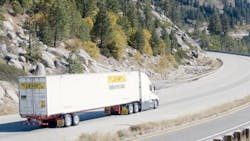J.B. Hunt execs: Look for bottlenecks to get worse through year-end
The leaders of J.B. Hunt Transport Services Inc. said on Oct. 15 they expect supply chain bottlenecks on the West Coast will further intensify into November and December, even as the company works with customers to ease congestion.
Speaking on the heels of releasing stronger-than-expected third-quarter results, J.B. Hunt CEO John Roberts and his senior team said demand across their businesses remains strong but outlined labor shortages and other restraining factors similar to those in the second quarter. Some of the cost increases now rolling through the industry, they added, will persist after the worst aspects of the disruption resolve themselves.
“The underlying cost of drivers and equipment is going to stay,” Chief Commercial Officer Shelly Simpson said on an Oct. 15 conference call. “We don’t see wages going down.”
Darren Field, president of J.B. Hunt’s intermodal division, told analysts and investors that it’s never been more difficult to attract and retain drivers and added that rail providers and others are competing for much of the same available talent. The trickiest factor in the labor equation, he said, is at customers’ warehouses, where shortages mean trailers are taking longer to unload and are further clogging up the system.
“I don’t know that we have a line of sight on any kind of dramatic improvements” in those places, Field said. “Customers have to process their supply chains and achieve their goals.”
The supply-chain woes—which last week led President Joe Biden to call for 24/7 supply chain operations at the ports of Los Angeles and Long Beach—are feeding through to J.B. Hunt’s own investment plans: For the second consecutive quarter, executives have trimmed their capital spending plans because equipment isn’t making its way to them in the expected or desired time frame. Whereas 2021 capex was forecast to be $1.25 billion in the spring and $1.15 billion in July, CFO John Kuhlow on Oct. 15 said it’s now likely to be “a little over $1 billion” for the year. Kuhlow added that initial plans for 2022 call for investments greater than that but that the timing of obtaining equipment largely will determine the final number.
Still, J.B. Hunt is growing its fleet, in part by holding on to some vehicles it would have traded in more normal times: The company’s intermodal division ended the quarter with 6,017 power units and 102,230 units of trailing capacity, up from 5,820 and 99,400, respectively, at the end of June. And its dedicated division also grew its fleet, finishing September with 1,527 more trucks than 12 months prior.
Two other items from the Oct. 15 conference call that looked ahead to 2022:
- While some carriers have begun forecasting what they expect pricing to be next year, J.B. Hunt isn’t yet prepared to commit to that. There are still too many uncertainties, execs said, to extrapolate the current pricing environment—for example, J.B. Hunt’s average revenue per intermodal load (excluding fuel surcharges) rose 18% year over year—into 2022.
- Don’t look for a notable drop in demand after the busy holiday season: Simpson said a number of retailers have told her team they expect shortages of certain products will lead to a bump in the sale of gift cards. That will push more holiday shopping into early 2022 and keep freight lanes full.
The strong earnings report drove shares of J.B. Hunt (Ticker: JBHT) up more than 9% on Oct. 15. They have risen more than 25% this year, growing the company’s market capitalization to more than $20 billion.
About the Author
Geert De Lombaerde
Senior Editor
A native of Belgium, Geert De Lombaerde has more than two decades of experience in business journalism. Since 2021, he has written about markets and economic trends for Endeavor Business Media publications FleetOwner, Healthcare Innovation, IndustryWeek, Oil & Gas Journal, and T&D World.
With a degree in journalism from the University of Missouri, he began his reporting career at the Business Courier in Cincinnati. He later was managing editor and editor of the Nashville Business Journal. Most recently, he oversaw the online and print products of the Nashville Post and reported primarily on Middle Tennessee’s finance sector and many of its publicly traded companies.

